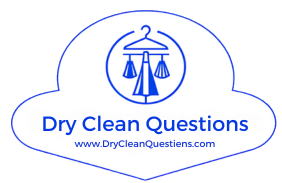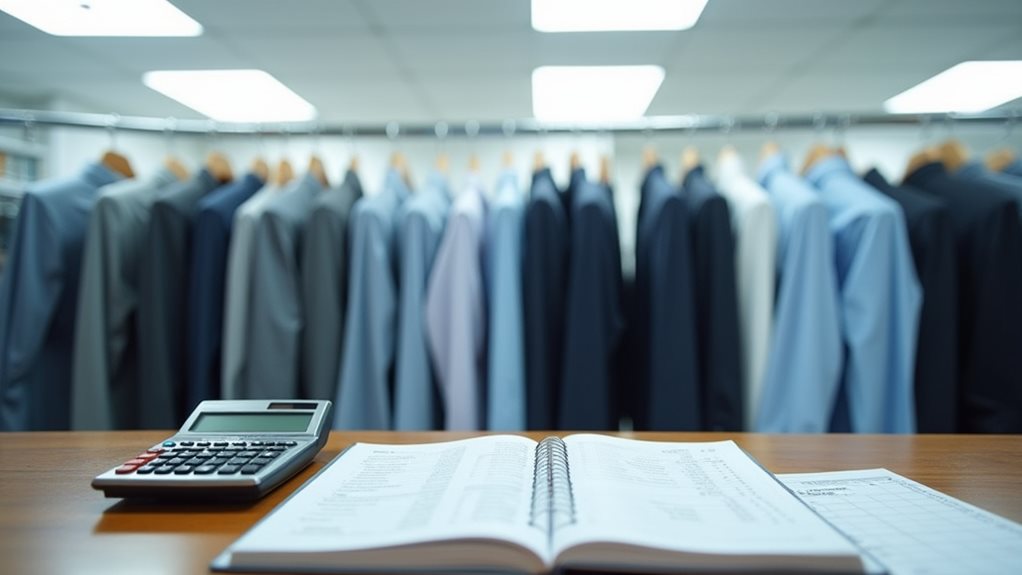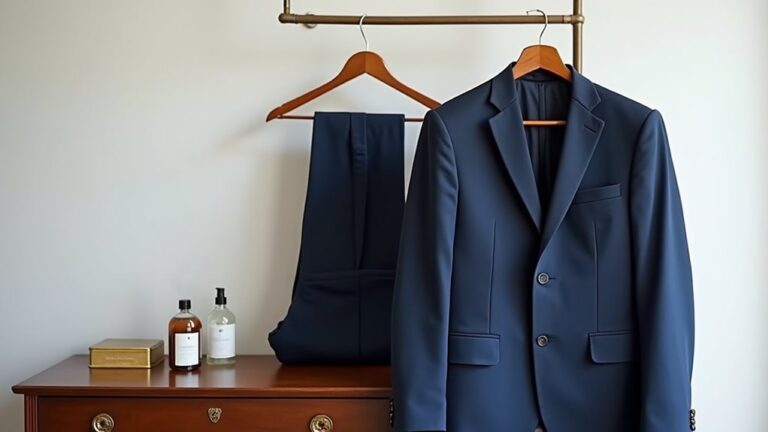You can deduct dry cleaning costs for work clothes, but there’s a catch—they must be required by your employer and completely unsuitable for everyday wear. This means your sharp business suits and dress shirts won’t qualify since you could theoretically wear them to dinner or social events. However, if you’re a police officer, firefighter, or healthcare worker wearing scrubs, you’re in luck! Self-employed folks have more flexibility here, while employees face federal restrictions until 2026, though some states offer workarounds that might surprise you.
Understanding IRS Rules for Clothing Deductions
When I first started my consulting business, I naively thought I could deduct the dry cleaning for every single blazer and dress shirt in my wardrobe, figuring that since I wore them exclusively for client meetings, they’d to qualify as business expenses.
Boy, was I wrong! 😅 The IRS has pretty strict rules about clothing deductions, and here’s what you need to know: your work clothes must be required by your job AND not suitable for everyday wear.
That sharp business suit you rock during presentations? Unfortunately, it’s considered street-appropriate, so you can’t deduct those dry cleaning costs.
However, if you’re self-employed and wear work-specific uniforms or protective gear that nobody would sport to the grocery store, then you’re golden for claiming those tax expenses.
For expenses under $75, the IRS doesn’t require receipts, but you’ll still need to maintain detailed records showing the business purpose, date, and amount of each dry cleaning expense.
Two-Prong Test for Qualifying Work Attire

When you’re trying to figure out if your work clothes qualify for dry cleaning deductions, you’ll need to traverse the IRS’s two-prong test, which honestly feels like solving a puzzle where both pieces must fit perfectly together.
Your clothing must first be specifically required by your employer for work duties, and second, it can’t be something you’d realistically wear to grab coffee with friends or run weekend errands.
I learned this the hard way when I tried deducting my business suits, thinking “I only wear these to work,” but the IRS doesn’t care about your personal fashion choices—if it looks normal outside the office, you’re out of luck! 😅
Remember to keep detailed receipts and records that prove your clothing serves an exclusive work-related purpose, as proper documentation is essential when claiming these deductions on your tax return.
Required Employment Condition
Your clothing must be mandatory for performing job duties, rather than merely recommended company attire.
If you’re required to wear uniforms, protective gear, or specialized garments that aren’t ordinary street wear, you’re halfway there.
However, remember that clothing must also be inappropriate for everyday use to qualify for tax deduction benefits, making dry cleaning expenses potentially deductible only when both conditions are met under this two-prong test with considerable tax implications.
Self-employed individuals can generally claim these business expenses on their tax returns, while employees may face different rules depending on current IRS regulations.
Everyday Wear Suitability
The second part of the IRS’s two-prong test focuses on whether your work clothing crosses over into what you’d reasonably wear on a Saturday afternoon to grab coffee with friends.
Honestly, this is where most people’s deduction dreams go to die. The IRS considers clothing suitable for everyday wear as completely ineligible for any tax deduction, even if you exclusively wear those items for work purposes.
Your sharp business suits, designer blazers, and professional attire won’t qualify for dry cleaning expenses deductions because they’re deemed appropriate for street wear.
However, specialized uniforms like those worn by police officers or firefighters typically pass this test since you wouldn’t wear them casually outside work duties, making their work clothing eligible under the two-prong test.
Items like safety gear and distinctive professional clothing that cannot be worn outside of work often qualify for deduction, while regular business suits and everyday professional attire typically cannot be claimed.
Both Criteria Essential
Although understanding each criterion individually helps clarify the rules, you’ll need both prongs working in perfect harmony to access those dry cleaning deductions.
Honestly, this is where I’ve seen countless taxpayers stumble because they assume meeting just one requirement is enough. Your clothing expenses won’t qualify for a tax deduction unless they’re both required by employer AND unsuitable for everyday wear – missing either criterion kills your deductible costs entirely.
I’ve watched clients confidently claim dry cleaning expenses for expensive suits, thinking the employment requirement alone was sufficient, only to face serious tax implications later when the IRS pointed out their “work clothes” were perfectly suitable for ordinary street wear.
Both conditions must exist simultaneously, no exceptions! 😅
Additionally, maintaining detailed records including receipts and documentation of business necessity becomes crucial for substantiating these dual requirements during any potential IRS review.
Why Business Suits Don’t Qualify for Deductions
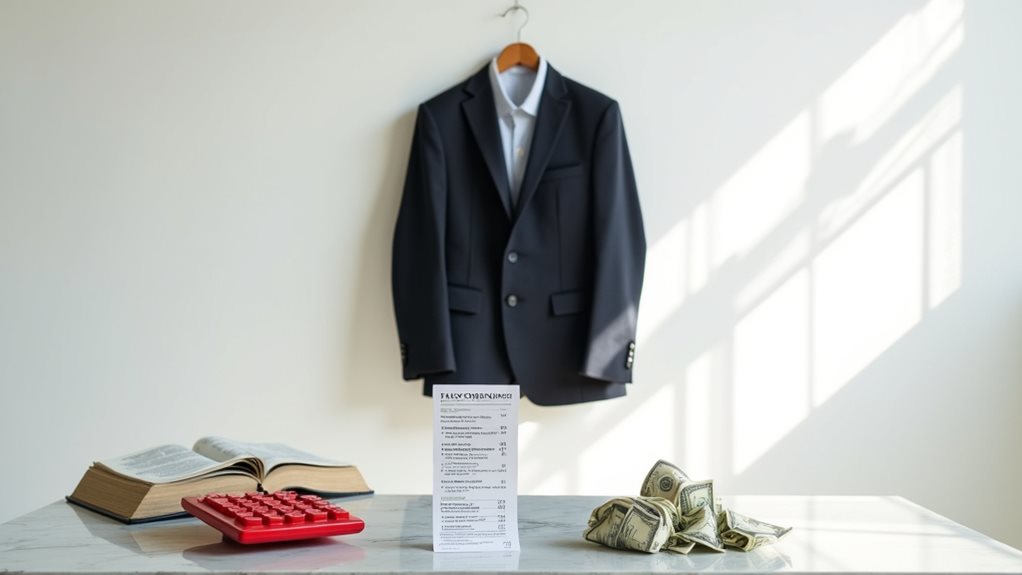
You might think your sharp business suit deserves a tax break since you wear it exclusively for client meetings, but the IRS isn’t impressed by your professional wardrobe choices.
The two-prong test trips up most business attire because suits, dress shirts, and slacks easily pass as everyday wear that you could sport to dinner, shopping, or social events without raising eyebrows.
Even though you’d never dream of wearing your $800 suit to grab groceries (trust me, I learned that lesson the hard way with a coffee spill 😅), the IRS considers it suitable for street wear, which automatically disqualifies both the suit and its dry cleaning costs from any deduction benefits.
This strict classification means that detailed records and receipts won’t help your case when the clothing could reasonably be worn outside of work settings.
IRS Two-Prong Test
Understanding why your expensive business suits don’t qualify for dry cleaning deductions starts with the IRS Two-Prong Test, a straightforward but unforgiving rule that’s crushed many professionals’ dreams of tax relief.
This test demands your clothing expense meet two strict conditions simultaneously: it must be required for employment AND unsuitable for everyday use.
Your sharp business attire tragically fails the second prong because, let’s face it, you could wear that suit to dinner, weddings, or casual social events 😅.
Even if your boss mandates suits daily, the IRS considers them suitable for everyday use, making those dry cleaning expenses completely non-deductible.
Both conditions must be satisfied together, and when casual wear potential exists, your tax implications disappear faster than your paycheck.
Business owners can deduct dry cleaning costs for business-related clothing, giving them an advantage that regular employees don’t typically enjoy under standard employment arrangements.
Everyday Wear Suitability
The harsh reality about everyday wear suitability becomes crystal clear when you imagine yourself at your nephew’s wedding, confidently sporting that same charcoal gray suit you wore to Tuesday’s board meeting.
This scenario perfectly illustrates why the IRS won’t budge on business suits and their dry cleaning expenses – they’re simply too versatile for everyday activities.
The IRS criteria demands that deductible expenses must involve clothing that’s unsuitable for ordinary street wear, and your business suits fail this test spectacularly.
Even when your employment requirement mandates professional attire, those tax implications remain unchanged because you could realistically wear that suit anywhere.
- Business suits work perfectly for dinner dates, religious services, and family celebrations
- The “suitable for ordinary street wear” rule eliminates most professional wardrobes from consideration
- Your dry cleaning bills for versatile clothing won’t qualify as deductible expenses
- IRS guidelines focus on clothing’s potential use, not your actual wearing habits
- Even expensive designer suits face the same everyday wear suitability restrictions
Only specialized uniforms or work-specific attire that cannot serve dual purposes for both professional and personal use may qualify for dry cleaning deductions.
Professional Attire Exclusions
Although business suits represent the cornerstone of professional wardrobes across countless industries, they’ve earned themselves a permanent spot on the IRS’s “absolutely not” list when it comes to deductible dry cleaning expenses.
Here’s the harsh reality: your sharp new navy blazer and matching trousers might command respect in boardrooms, but they’re considered everyday wear by tax standards. The IRS specifically excludes common business attire because you can wear clothing outside of work without looking ridiculous 😅.
Even if you never deduct the cost of that dry cleaning bill, remember that IRS and state taxing authorities remain consistent on this rule. Until tax laws change dramatically, your professional wardrobe expenses stay personal.
However, self-employed individuals may find more opportunities to claim dry cleaning deductions for business purposes, especially in client-facing roles where specific dress requirements apply.
Professions That May Qualify for Dry Cleaning Deductions

When I first started helping people steer through tax deductions, I was surprised to discover how many hardworking professionals can actually claim their dry cleaning expenses, especially those who wear specialized uniforms that would look completely out of place at a weekend barbecue.
Many hardworking professionals overlook claiming dry cleaning expenses for specialized uniforms that clearly aren’t everyday wear.
Here’s who typically qualifies for these eligible deductions:
- Police officers and firefighters – Your specialized uniforms clearly aren’t everyday wear
- Healthcare workers – Scrubs and medical attire meet IRS criteria for work-specific clothing
- Mechanics and tradespeople – Job-specific coveralls that you’d never wear to dinner
- Food service employees – Required uniforms unique to your restaurant or establishment
- Self-employed individuals – Your specialized work attire can qualify if it meets tax guidelines
Remember that maintaining detailed records and receipts is crucial to support any dry cleaning deductions you claim on your tax return.
Federal Vs State Tax Treatment of Cleaning Expenses
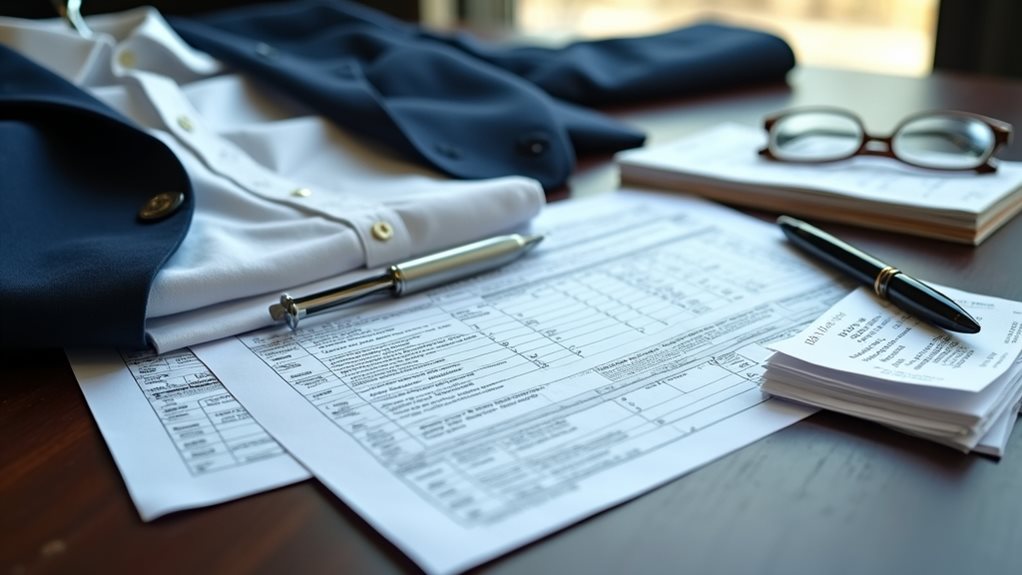
Knowing which professions qualify is just half the battle, because maneuvering the maze of federal versus state tax rules for dry cleaning deductions can feel like trying to solve a puzzle where someone keeps changing the pieces.
Here’s the deal: federal vs state tax treatment creates a confusing terrain where you must understand both sets of rules. While Congress suspended federal deductions for employees until 2026, self-employed individuals can still deduct dry cleaning expenses if they meet the IRS’s qualifying criteria for business attire.
Meanwhile, state tax regulations often march to their own drummer, with some states ignoring federal changes entirely. This means you could potentially claim tax deductions on your state return even when federal law says no – talk about a silver lining! 😊
Self-Employed Vs Employee Deduction Options

Here’s where the rubber meets the road, and frankly, where I’ve seen countless taxpayers get tripped up over the years – the rules for dry cleaning deductions split dramatically depending on whether you’re self-employed or working as someone else’s employee.
If you’re self-employed, you can deduct dry cleaning expenses when your qualifying clothing meets strict IRS criteria, meaning it’s exclusively for work and never worn outside business contexts.
However, employees got the short end of the stick when Congress suspended these deductions on federal tax returns from 2018 through 2026.
Here’s what you need to know:
- Self-employed individuals can claim work attire expenses as business deductions
- Employees can’t deduct dry cleaning costs on federal returns currently
- State tax returns might still allow deductions for employees
- Qualifying clothing must be exclusively business-related
- Tax deductions require proper documentation and receipts
Documentation Requirements for Claiming Expenses
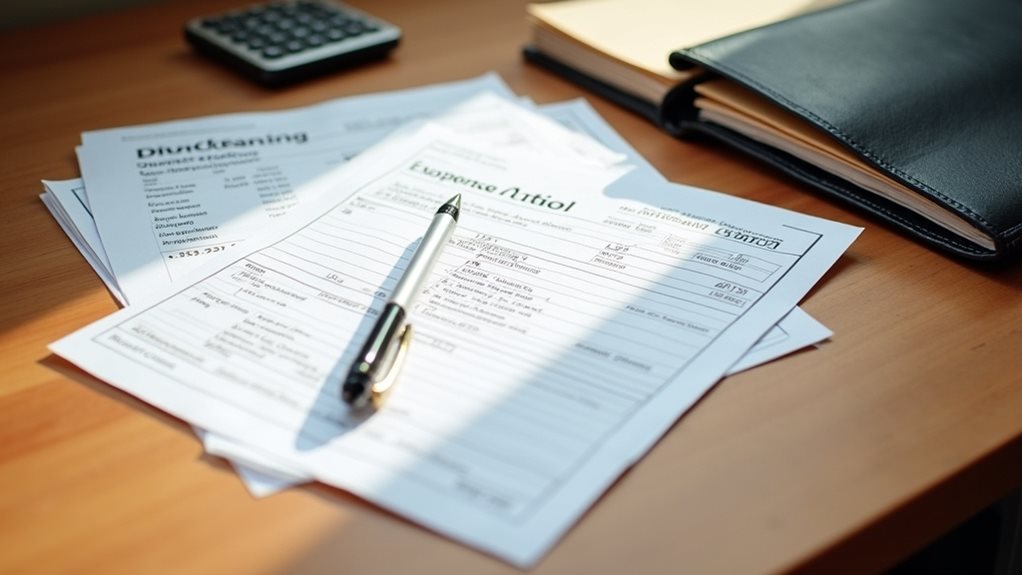
Good documentation separates the taxpayers who sail through audits from those who end up scrambling through shoeboxes at 2 AM, and I’ve watched far too many people learn this lesson the hard way.
When claiming dry cleaning expenses, you’ll need receipts showing the date, items cleaned, and total cost—simple stuff that becomes essential during IRS scrutiny.
Self-employed folks especially need organized documentation for work-related clothing deductions, because the burden of proof falls squarely on your shoulders.
Keep a log summarizing your expenses, noting how each item exclusively serves work purposes (your lucky interview blazer counts, your weekend jeans don’t 😉).
Trust me, maintaining detailed records transforms potential audit nightmares into straightforward conversations with tax authorities.
Future Changes to Dry Cleaning Deduction Laws
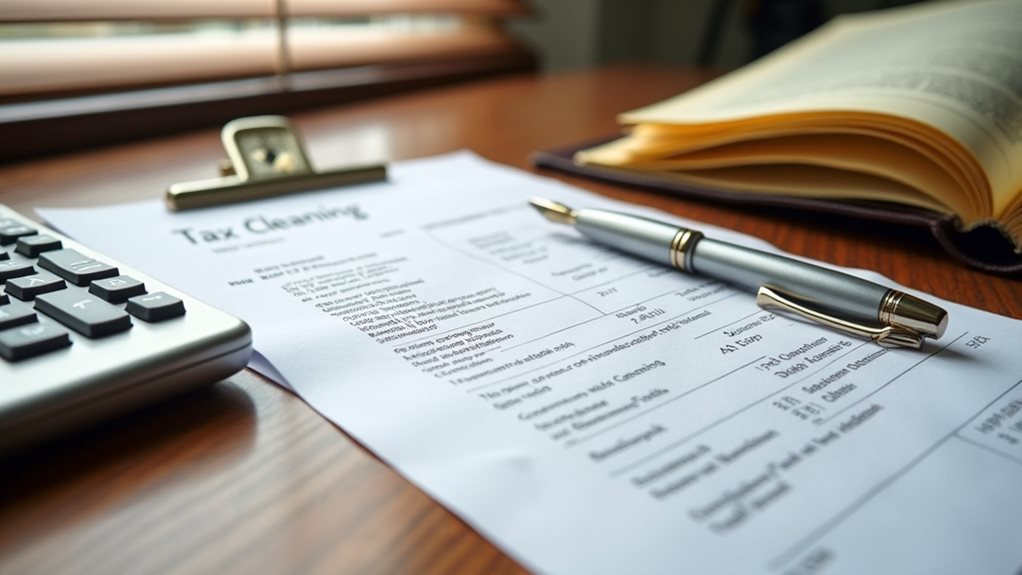
While tax laws change about as predictably as my teenager’s mood swings, the future of dry cleaning deductions hinges on political winds that could shift dramatically after 2026.
Currently, federal tax law suspends these deductions for employees, but self-employed individuals can still maneuver qualifying criteria for legitimate business expenses.
Federal law currently blocks employee dry cleaning deductions, but self-employed professionals can still claim legitimate business-related cleaning expenses.
Here’s what you should watch for:
- Congressional action to reinstate employee deductions post-2026
- State regulations that might diverge from federal suspension rules
- IRS updates clarifying self-employed deduction parameters
- Improved qualifying criteria for business-related dry cleaning
- Tax planning opportunities through strategic business structuring
Smart tax planning means staying connected with tax professionals who monitor these evolving environments.
While we can’t predict exactly when federal changes will occur, keeping your documentation organized and understanding state-specific opportunities positions you perfectly for future deduction possibilities.
